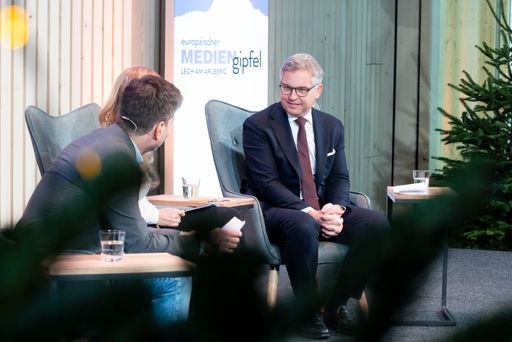The 16th European Media Summit brought together top-class experts, journalists and decision-makers to discuss the most pressing geopolitical, economic and media issues of our time. Over three days, the focus was on challenges such as the rise of global blocs, the future of journalism and Europe’s role in a changing world.
With the question “Is the EU reinventing itself?” Or is it more like the continent is crumbling?” Ivo Mijnssen, President of the Foreign Press in Vienna, opened the European Media Summit. International experts such as ex-Mossad agent Ram Igra and military expert Franz-Stefan Gady highlighted geopolitical conflicts, including the conflicts in the Middle East. Igra emphasized that “the end of a war is always political and never military.” Donald Trump’s return to the White House and its impact on Europe were also intensively discussed. Political scientist Ivan Krastev warned of a geopolitical test for Europe, while China expert Chaoting Cheng pointed to the growing tensions between China and the USA.
The future of journalism was another key topic. Ex-ORF correspondent Tim Cupal called for precise reporting in order to avoid generalizations and prejudices. Susanne Glass (BR) explained that journalists were increasingly becoming targets themselves and spoke of an impending “collapse of democracy”.
Europe’s challenges in the super election year 2024
The second day was dedicated to global power shifts and Europe’s media identity. In the discussion “Trump wins – Europe loses?” Othmar Karas (retired First Vice President of the European Parliament) called for more European independence. Hannelore Veit (ex-ORF correspondent) emphasized Trump’s negotiating skills: “He is a dealmaker and an opportunist.” Europe’s economic perspective was the focus of a discussion with the designated Austrian National Bank governor Martin Kocher and the star economist Gabriel Felbermayr. Kocher explained: “We cannot influence some external factors such as the war in Ukraine, but in Austria we no longer have to save every company from bankruptcy.” Felbermayr was optimistic about industrial development: “In the industry, the expectations are better than the current ones Situation.” At the same time, he warned of the risks of wealth taxes, as capital could migrate to countries with lower tax burdens.
Europe’s digital competitiveness
Author Thomas Ramge emphasized that Europe’s future depends on targeted investment rather than excessive regulation. Barbara Thaler (WK President Tyrol) emphasized: “The inner drive to work for sustainability and innovation is the best engine for our future.” Herbert Tanner (Head of Software Development for the Digital Industry at Siemens) added that technological advances are often accompanied by negative ones Headlines would be overshadowed.
Social challenges: Islamic extremism
The social dimension of European security was highlighted by women’s rights activist Seyran Ateş. In a conversation with Alexandra Föderl-Schmid (Süddeutsche Zeitung), she warned of the growing Islamic extremism in Europe. She stressed that Europe must finally wake up and accept the reality of a significant Islamist problem. “The communities were left alone after the large influx of refugees, and now we are faced with a challenge that threatens to overwhelm us,” said Ateş.
Magnus Brunner on the EU security strategy
In the press session with EU Commissioner Magnus Brunner conducted by Meret Baumann (NZZ) and Tim Cupal (former ORF correspondent in Brussels), the focus was on the challenges facing the European Union. For Brunner, the migration issue is, among other things, explosive: “We have to arm ourselves.” Further flows of refugees, for example from Lebanon, are foreseeable. Security ideas are contained in a strategy that he wants to present in 100 days. “People need to get the feeling again that we have control over what happens in Europe,” said Brunner.
“We have to talk about integration”
Despite the central importance of the integration issue, including for elections, hardened fronts would make finding solutions more difficult, according to Ilkay Idiskut (teacher & protagonist in the current documentary film “Favoriten”). According to Idiskut, 45 percent of school children in Vienna cannot follow language lessons. It is a number that has to be taken seriously. The solution is mixing. “Because there is no such mix today, I can also shop in a Turkish supermarket and don’t need to speak German,” says Idiskut. For Coquelin, integration means a change of perspective. This makes sense not only ethnically, but also in terms of aspects such as salary.
About the European Media Summit Lech am Arlberg
Since its founding in 2007, the European Media Summit in Lech am Arlberg has provided an exceptional framework for discussions in which unfiltered insights and well-founded perspectives are offered into the ongoing turbulent world of media, European politics and the economic and socio-political context of the reality of European life. The European Media Summit, which has been under the patronage of the Austrian Foreign Ministry from the start – initiated by the communications agency ProMedia Kommunikation and since then organized with Lech Zürs Tourismus GmbH and the Association of Foreign Press in Vienna – is supported by the municipality of Lech and the state of Vorarlberg. Other partners include the Habitat Tirol Group with Tirol Werbe and the Tirol Location Agency, the Tyrol Industrial Association and Siemens. The “Media Academy” is made possible and supported by the Austrian Economic Chamber, the APA – Austria Press Agency and Moser Holding.
